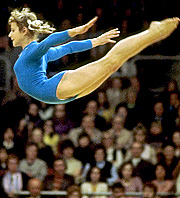We're All Winners
Charlie Schroeder
AUGUST 9, 2008
- Olga Korbut
- (Allsport UK/Allsport)
- View the Slideshow
Web Resources
Related Stories
More From Charlie Schroeder
To mark the 29th Olympiad, Weekend America contributor Charlie Schroeder spoke to some iconic athletes who changed the rules of the game, or made history on and off the playing field, for the New York Times' Play magazine.
Weekend America is excerpting some of those interviews to share with you.
Mary Decker Slaney
Mary Decker-Slaney was the favorite to win the 3,000 meters at the 1984 Summer Olympics in Los Angeles.
At the time she worked with a coach who, as she puts it, "always had...plans." Decker-Slaney (who married British discus thrower Richard Slaney in 1985, but was known as Mary Decker at the '84 Olympics) usually ignored them, but in L.A., she didn't. Before the race, her coach told her to let someone else take the lead for a couple laps if they wanted to. Against her better judgment, that's just what Decker-Slaney did.
"I liked leading," Decker-Slaney says. "I felt most comfortable leading, and I'd run from the front my entire career, so to try and do something different in the Olympics from a personal standpoint, was really stupid."
With less than a kilometer to go, the diminutive and shoeless South African Zola Budd came up beside Decker-Slaney and took the lead. Decker let her and even though neither were "pack runners," they were soon inches apart with two other runners close behind. After an initial bump, Decker tangled with Budd and went down in the infield, where she writhed in pain.
"Some people think she tripped me deliberately. I happen to know that wasn't the case at all," Decker-Slaney says.
Today, Decker-Slaney takes an optimistic view of those events. "More people in this country and in the world took notice of a women's track event because of what happened. And people remember the person that fell. It's not like, 'Well, didn't you win a medal?' or 'What medal did you win?' it's like they know I fell."
Nadia Comaneci
In 1976, no one had ever scored a perfect ten in an Olympics gymnastics competition. In fact, the judges considered the odds of somebody pulling it off so low that the scoreboards weren't even equipped to handle the appropriate number of digits.But that didn't stop 14-year-old Nadia Comaneci from scoring a perfect 10. Seven times.
The Romanian gymnast, who now lives in Norman, Okla., owns nine Olympic medals, five of which are gold, but her favorite memory remains that first 10.
"I didn't know that nobody scored a ten before," Comaneci says. "I didn't know because I didn't want to compete to make history, I wanted to compete to be the best."
Turns out, she did both.
After a flawless uneven bars routine, Comaneci says she heard a lot of applause and turned to see the scoreboard display a "1.0." At first her heart sank (she thought she'd failed)--then she realized it was actually a perfect ten.
"What you feel at 14, it's great," Comaneci says now. "But it's not even close to what you feel when you look back. It's so hard to do something in life today that people tell you, 'I remember that moment 32 years ago and I remember where I was and with who I was and it's, you don't know that when you're 14. Now it feels huge."
Olga Korbut
Olga Korbut was a fan favorite at the 1972 games in Munich, Germany.
"I [was so] recognizable," she says. "I feel like at home and whole world is mine. I loved that. This is what I loved about the Olympic games. [It] was like a big family."
That year, the 16-year-old's routines and infectious smile were beamed throughout the world and temporarily thawed the chilly relationship between the Soviet bloc and the West.
In particular, her trademark move, the "Korbut Flip," a back somersault that originated from the highest uneven bar, wowed everyone who saw it.
"I always afraid to do that, but I always did it good." Dangerous, but also exciting to the young Belorussian. "I felt when I did it. I fly, like, no bars, no beam. Just air."
After her routines, Korbut says she looked at the audience, but didn't see or hear them. "I was so concentrated on [my] routine...I just hear clapping but not actually clapping you know, just like 'boom, boom, boom.'"
But there was no question she'd won them over, which, as she tells it, was better than winning the gold.
"If you win audience...this is biggest medal in your life. If audience love you, everybody will love you."
-
- Music Bridge:
- Thriftstore Jewelry
- Artist: The Bad Plus
- CD: Prog (Do The Math)







Comments
Comment | Refresh
From Cincinnati, OH, 08/13/2008
I was hoping you would interview Amanda Borden who also won gold in gymnastics. My daughter practiced at the same gym and I think Amanda had a baby this time last year. thanks.
Post a Comment: Please be civil, brief and relevant.
Email addresses are never displayed, but they are required to confirm your comments. All comments are moderated. Weekend America reserves the right to edit any comments on this site and to read them on the air if they are extra-interesting. Please read the Comment Guidelines before posting.
You must be 13 or over to submit information to American Public Media. The information entered into this form will not be used to send unsolicited email and will not be sold to a third party. For more information see Terms and Conditions and Privacy Policy.